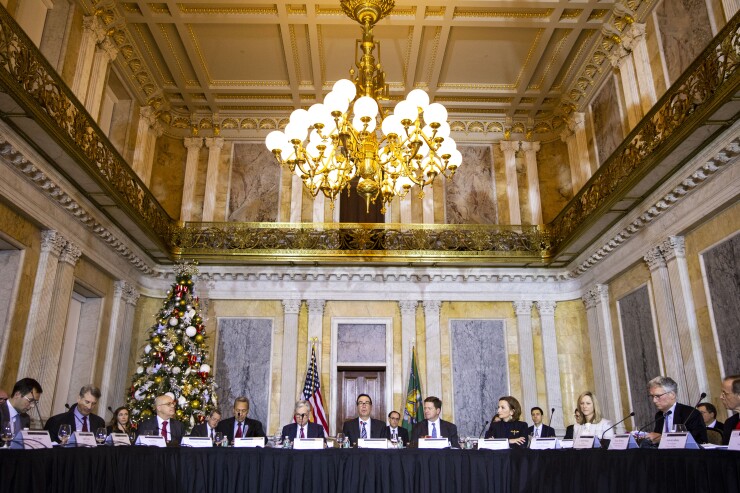WASHINGTON — The Financial Stability Oversight Council will hold its first open meeting of the year Wednesday against the backdrop of a continuing debate over whether the panel created by the Dodd-Frank Act really matters anymore.
The council has come full circle on what many view as its primary function: designating specific nonbank financial firms seen as a danger to the global markets and in turn subjecting them to banklike oversight.
After the Obama-era council designated four firms — three of them insurance giants — as "systemically important financial institutions," all of them have since been dedesignated. The last remaining SIFI, Prudential, successfully shed the label in October.

There are a wide range of possible directions in which Treasury Secretary Steven Mnuchin, who chairs the FSOC, could now take the council. Some observers suspect the council will focus more on risky activities across the industry rather than on specific firms. But others question the panel's relevance now that it has moved on from its most visible and controversial authority.
“The bottom line is the FSOC is doing next to nothing under Treasury Secretary Mnuchin,” said Gregg Gelzinis, a research assistant for the economic policy team at the Center for American Progress. “The only thing they were doing was going through the process of releasing firms from enhanced oversight, and now that that is complete, I really do think they’re not doing anything.”
Other observers applaud the council for changing course and say it is natural for the FSOC's role to evolve over time. The Dodd-Frank Act, which created the council to identify and head off approaching systemic risks, gave it a range of powers other than designating nonbanks, from publishing advisories on potential sources of systemic risk to making formal recommendations for new rules.
David Portilla, a partner at Debevoise & Plimpton and former Treasury official, said each of the council's roles has an appropriate place and may be more warranted as conditions change.
“FSOC isn’t designed to be constantly finding new companies to designate and then designating them,” Portilla said. “In some sense, I think it’s natural for the FSOC to step back and pause on designations after the cycle it went through.”
The council on Wednesday is slated to consider proposed changes to its guidance on nonbank designations, but such a proposal could provide instructive language on designating certain risky activities as the basis for regulating nonbanks, an approach that Assistant Treasury Secretary Craig Phillips said the council was “
A 2017 Treasury report on the financial regulatory framework knocked down conventional wisdom that the Trump administration would ignore the council, suggesting that the FSOC should have even more power, including “the authority to appoint a lead regulator on any issue on which multiple agencies may have conflicting and overlapping regulatory jurisdiction.”
The FSOC already has the power to resolve jurisdictional disputes between regulators and the power to recommend agencies regulate certain activities that have been determined by the council to pose a systemic risk. The council also is required to hold at least two public meetings per year and produce an annual report on risks to the financial system.
But it is the designation power that has occupied much of the public’s attention toward the council in its first decade of existence.
In July 2013, the council designated insurance company American International Group and nonbank financial firm GE Capital as the first nonbank SIFIs, and in September of that year it designated the insurance giant Prudential. In December 2014, the council
The Trump administration
To be sure, the process of dedesignation began well before the Trump administration took office. GE Capital restructured itself beginning in 2015 and ultimately was
Some observers said there are still specific firms that demand the attention of the FSOC's designation authority.
“The biggest thing on FSOC's to-do list is to designate Fannie [Mae] and Freddie [Mac] as the SIFIs they so obviously are in fact,” said Alex Pollock, distinguished senior fellow of finance, insurance and trade at the R Street Institute. “If Fannie and Freddie are not SIFIs, then no one in the world is a SIFI.”
Whether the FSOC as a body is inclined to move in that direction is unclear, but at least some of the council’s members have expressed skepticism about designating the two government-sponsored enterprises as SIFIs. When asked about the subject in 2017, then-Federal Reserve Board Gov. Jerome Powell — before being tapped to chair the Fed later that year — championed legislative GSE reform and was unenthusiastic about the prospect of designating the GSEs themselves as SIFIs.
“You also need structural reform,” Powell said. “It’s not a question of capital standards. You need legislation that would restructure those entities.”
Portilla said that the FSOC’s activities will probably shift and bend over time, depending in part on the priorities of the administration in power but also on the traditions that will gradually build up within the institution itself. Wielding the power to designate nonbanks as SIFIs need not be the only determinant for whether the council is successful or vigorous, he said.
“I view it less as a change in guiding principle than as a natural evolution of a still relatively young regulatory agency,” Portilla said. “A successful FSOC doesn’t need to use those authorities necessarily, because its success will be in the power of convening the body and ensuring the regulators talk to each other and are sharing information and addressing risks and not leaving them unaddressed.”
But Gelzinis argued that the agency ought to be using all of its authorities more vigorously, including designating nonbanks as SIFIs. Future administrations may not be so content to wield the council's soft powers alone, he said.
SIFI designations are "an important power, and the next progressive administration should use it aggressively,” Gelzinis said. “It’s one of the most important pieces of Dodd-Frank. It’s fine to write reports about risks, but this actually gives FSOC the power to do something about it.”





